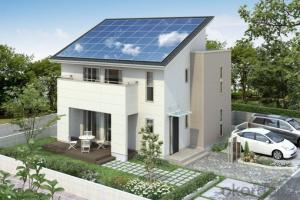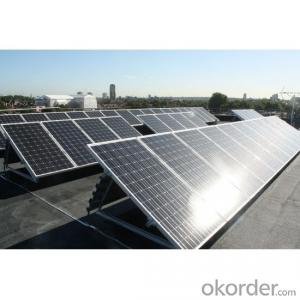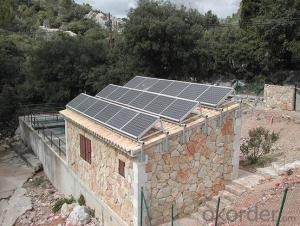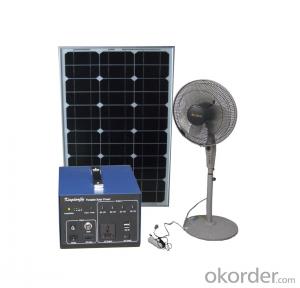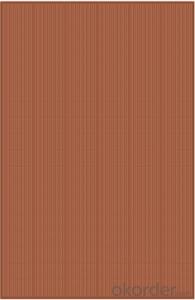Roof and Ground Solar System Falsh Sale New
- Loading Port:
- Shanghai
- Payment Terms:
- TT or LC
- Min Order Qty:
- 2000 watt
- Supply Capability:
- 2000000 watt/month
OKorder Service Pledge
OKorder Financial Service
You Might Also Like
| Quick Details | |||||
| Specification: | Normal | Application: | Home | Output Voltage (V): | AC110V/220V |
| Load Power (W): | 3KW | Solar Power (W): | 3KW | Work Time (h): | 48 |
| Cables: | 50m | Solar Panel Rack: | Optional | Battery Capacity: | 12V/200AH*8pcs |
| Controller Voltage: | 48V | Inverter Output Voltage: | AC220V/110V | Efficiency: | 90% |
| Inverter: | DC48V | Rated Output Capacity: | 3000W | Solar Panel Power: | 250w*12pcs |
| Solar Panel Type: | Crystalline Silicon PV Module | ||||
| Packaging & Delivery | |
| Packaging Detail: | using carton or wooden box as per customer's requirement. |
| Delivery Detail: | within 10~30 days for shipment depending on order quantity |
Excellent battery backup 300W to 10KW off grid solar system with grid power switch
Anern Advantage:
1) Over 10 year experience in clean energy line, business covering solar street light, solar garden light, off grid
solar system and on grid solar power system, etc;
2) Exporting for worldwide, with satisfied clients more than 50 countries;
3) Competitive price, excellent service, integrated certificate system;
We supply CE, RoHS certificates if you need
Welcome to visit our factory at any time.
Solar system advantages:
1. CE, ROHS approved.
2. High conversion efficiency, high-transmission rate.
3. Energy saving, environmental-friendly.
4. Advanced technology, strict quality control system.
5. Easy installation, safe operation, free maintenance.
6. Low MOQ, fast delivery time, long service life
| Specifications: | ||
| Ref No. | OFF-SGHP-3KW | |
| System Basic Information | Solar Panel Rated Output Power | 3KW |
| Suitable for Max Daily Power Consumption | 10KWH | |
| Rated Output AC Capacity | 3KW | |
| Solar panel | ||
| Type | Crystalline Silicon PV Module, A-class | 12pcs |
| Max Power | 250W | |
| Vmp | 30.5V | |
| Size | 1655*992*45mm | |
| Weight | 22.5kg/pc | |
| 25 years power output guarantee (Note: 2pcs panels connect in series) | ||
| Controller | ||
| Voltage | 48V | 1pc |
| Current | 60A | |
| Warranty | 1 year | |
| PWM high-efficiency charging controller, LED display, intelligent control; Temperature compensation, various protections. | ||
| Circuit Breaker | Used for protection of controller, installed between PV array combiner and controller | 1pc |
| Inverter | ||
| Input Voltage | DC48V | 1set |
| Output Voltage | AC220V/110V 1-phase | |
| Frequency | 50/60Hz | |
| Efficiency | 90% | |
| Note: This inverter provides grid power switch and battery charging functions. | ||
| Battery | ||
| Capacities | 12V/200AH per piece | 8pcs |
| Service life | 5 to 6 years | |
| Warranty | 3 years | |
| Solar panel rack | Flat-roof type mounting rack, steel material, anti-rust treatment | 1 set |
| (Other types of racks can be customized as per client's requirement) | ||
| Cable | 50m | |
| Connectors | 3-terminal connectors, used for panels connection in parallel | 6 set |
Product features:
1. Off grid solar power system is mainly used for application with relatively-small power consumption, and the areas have no grid network coverage, or grid power is unstable or outage condition.
2. It’s composed of solar panels, hybrid solar inverter, battery bank, solar panel mounting racks, and other accessories required fora complete home solar power system.
3. The battery bank gives a stable power output to the solar inverter which converts DC to AC to power loads, and provides power backup in rainy or cloudy days.
4. The solar panels generate electricity at daytime and charge the battery bank .
5. The off grid home solar power system provides grid power bypass in case of battery power shortage when sunshine is not enough.
6. All the off grid home solar power system configurations are worked out by scientific calculation and design.
FAQ
We have organized several common questions for our clients,may help you sincerely:
1.How about your company?
We are a private-owned high-tech company who specializes in developing, manufacturing and marketing of silicon ingots, solar wafer, solar cells, solar modules, PV systems and solar applications products.
At present, We has one research & development team, whose members are well-known experts in photovoltaic area. We also have advanced production and test equipment.
2.How to guarantee the quality of the products?
Our products have been certified by CE, CEC,MCS, IEC61215, IEC61
730 and ISO9001.
• 25 year transferrable power output warranty: 10 years / 90%, 25 years / 80%*
• 12 year material and workmanship warranty
• Timeliness of delivery
• Quality Products certified (TUV, IEC, CE.ISO9001.MCS)
3.How long can we receive the product after purchase?
In the purchase of product within three working days, We will arrange the factory delivery as soon as possible. The pecific time of receiving is
- Q:What is the impact of hurricanes on solar panels?
- Hurricanes can have a significant impact on solar panels. The high winds associated with hurricanes can potentially damage or dislodge solar panels from their mountings, especially if they are not properly secured. This can result in the complete destruction of the panels or render them ineffective in generating electricity. Additionally, flying debris during a hurricane can cause physical damage to the solar panels, such as cracks or shattered glass. This damage can impair the functionality of the panels and decrease their efficiency in converting sunlight into electricity. The heavy rainfall that often accompanies hurricanes can also pose a threat to solar panels. If water seeps into the panels, it can cause electrical short circuits or damage to the internal components, rendering them unusable. Furthermore, hurricanes can cause power outages, which can affect the functionality of solar panels. If the electric grid is down, the solar panels may not be able to send excess energy back into the grid or receive power from it, limiting their ability to generate electricity. However, it is worth noting that solar panels are designed to withstand various weather conditions, including strong winds and heavy rain. Properly installed and maintained solar panels can have a higher likelihood of surviving a hurricane with minimal damage. Additionally, advancements in solar panel technology, such as stronger glass and improved mounting systems, are continuously being made to enhance their resilience to extreme weather events. Overall, while hurricanes can have a negative impact on solar panels, with proper precautions and maintenance, their durability can be improved, making them a viable and sustainable energy option even in hurricane-prone areas.
- Q:How do solar energy systems impact energy efficiency measures?
- Solar energy systems can significantly impact energy efficiency measures by reducing the reliance on traditional energy sources. By harnessing the sun's energy, solar systems provide a clean and renewable source of power, which in turn reduces the consumption of fossil fuels. This results in decreased greenhouse gas emissions and a more sustainable energy supply. Additionally, solar energy systems often encourage the adoption of energy-efficient practices, such as implementing energy-saving appliances or improving insulation, to maximize the benefits of solar power. Overall, solar energy systems play a crucial role in enhancing energy efficiency measures and promoting a greener and more sustainable future.
- Q:Can a solar energy system be installed in an apartment or rental property?
- Installing a solar energy system in an apartment or rental property is indeed feasible, but there are several factors to bear in mind. To begin with, it is crucial to ascertain whether your landlord or property owner is amenable to the idea of a solar energy system. Some landlords may be supportive of green initiatives and might even contribute to the installation costs. Conversely, others may have stipulations in place, necessitating a discussion with them prior to moving forward. Secondly, the viability of installing a solar energy system in an apartment or rental property hinges on the availability of appropriate space for solar panels. Typically, this would be the rooftop of the building. If the rooftop is shared among multiple tenants, it is necessary to engage in dialogue with them and obtain their consent as well. Furthermore, the legal and financial aspects should not be overlooked. Engaging the services of a solar energy contractor to assess technical feasibility and installation costs may be necessary. Additionally, it is crucial to research the laws and regulations pertaining to solar installations on rental properties in your area, as there may be specific prerequisites or permissions required. Lastly, if you are a tenant, the duration of your lease must be taken into account. Installing a solar energy system is a long-term investment, and it may not be financially viable if you plan to vacate the premises before the system has recouped its costs through energy savings. In conclusion, while it is possible to install a solar energy system in an apartment or rental property, open communication with your landlord, consideration of available space, evaluation of legal and financial aspects, and contemplation of your lease duration are all vital before proceeding.
- Q:Can solar energy systems be used for powering industrial processes?
- Yes, solar energy systems can certainly be used for powering industrial processes. Solar power has gained popularity in recent years as a sustainable and renewable energy source. Industrial processes often require a significant amount of energy, and solar power can be harnessed to meet these demands. There are several ways in which solar energy systems can be utilized for industrial processes. One common method is through the installation of solar photovoltaic (PV) panels. These panels convert sunlight directly into electricity, which can then be used to power various industrial machinery and equipment. By integrating solar PV systems into the existing infrastructure, industries can reduce their dependence on traditional fossil fuels and lower their carbon footprint. In addition to generating electricity, solar thermal systems can also be used to power industrial processes. Solar thermal technology uses the sun's heat to produce steam, which can then drive turbines or provide direct heat for industrial applications. This method is particularly useful for industries that require high-temperature processes, such as manufacturing, chemical production, or food processing. Implementing solar energy systems for industrial processes offers numerous benefits. Firstly, it helps to reduce greenhouse gas emissions and combat climate change. Solar power is a clean energy source that releases no harmful pollutants or greenhouse gases during operation. By transitioning to solar energy, industries can contribute to a more sustainable and environmentally friendly future. Moreover, utilizing solar power can help industries save on energy costs in the long run. While the initial investment for installing solar energy systems may be high, the operational costs are significantly lower compared to traditional energy sources. Once the systems are in place, industries can benefit from reduced electricity bills and even generate excess energy that can be sold back to the grid. Lastly, solar energy systems offer a reliable and resilient power source. They can operate even in remote areas or during power outages, ensuring uninterrupted production processes. Additionally, solar panels have a long lifespan and require minimal maintenance, making them a viable long-term solution for industrial power needs. In conclusion, solar energy systems can indeed be used for powering industrial processes. With the advancements in solar technology and the increasing focus on sustainability, more and more industries are embracing solar power to meet their energy demands. By harnessing the sun's energy, industries can reduce their environmental impact, save on energy costs, and ensure a reliable and resilient power supply for their industrial processes.
- Q:Can solar energy systems be used in areas with limited access to electricity?
- Areas with limited access to electricity can indeed utilize solar energy systems. In fact, solar energy presents a viable solution for such areas due to its independence from the traditional power grid. By installing solar panels on rooftops or open spaces, sunlight can be harnessed and converted into electricity. This generated electricity then becomes available to power various appliances and devices, offering a reliable and sustainable energy source. Furthermore, solar energy systems can be combined with energy storage systems, like batteries, to store surplus energy produced during the day for usage during periods of low sunlight or at night. Consequently, a constant supply of electricity is ensured even in areas with limited sunlight. Moreover, solar energy systems prove to be cost-effective in the long term as they diminish reliance on costly fossil fuels and contribute to lower electricity bills. Ultimately, solar energy systems emerge as practical and efficient solutions for areas lacking adequate access to electricity, providing an environmentally friendly and renewable power source.
- Q:How do solar energy systems impact the aesthetics of a building?
- Solar energy systems can have a positive impact on the aesthetics of a building by providing a modern and eco-friendly appearance. With sleek and stylish designs, solar panels can blend seamlessly with the architecture, enhancing the overall visual appeal of the structure. Additionally, solar panels can also be incorporated into various building materials like windows or roof tiles, further minimizing any visual impact.
- Q:How does solar energy affect property value?
- Solar energy can significantly increase property value by reducing energy costs, offering potential tax incentives, and appealing to environmentally conscious homebuyers.
- Q:Can solar energy systems be used in powering manufacturing plants?
- Yes, solar energy systems can definitely be used to power manufacturing plants. In fact, many manufacturing plants around the world are already utilizing solar energy as a clean and sustainable source of power. Solar panels can be installed on the rooftops or in open spaces adjacent to the manufacturing facility to harness the sun's energy and convert it into electricity. Solar energy systems have several advantages for manufacturing plants. Firstly, they can significantly reduce electricity costs, as the energy generated by the solar panels can be used to power the plant's operations, thus reducing the reliance on traditional fossil fuel-based energy sources. This can result in substantial savings in the long run. Additionally, solar energy systems have a relatively low maintenance cost and a long lifespan, making them a cost-effective investment for manufacturing plants. With proper maintenance and care, solar panels can last for 25 to 30 years or even longer. This means that manufacturers can benefit from reduced electricity costs for an extended period. Moreover, solar energy is a clean and renewable source of power. By using solar energy systems, manufacturing plants can significantly reduce their carbon footprint and contribute to environmental sustainability. This aligns with the growing global focus on reducing greenhouse gas emissions and transitioning towards clean energy sources. It is important to note that the feasibility of using solar energy systems in manufacturing plants depends on various factors such as the available space for solar panel installation, the energy requirements of the plant, and the local climate. However, advancements in solar technology and decreasing costs have made solar energy an increasingly viable option for many manufacturing plants. In conclusion, solar energy systems can definitely be used to power manufacturing plants. They offer numerous advantages, including cost savings, environmental sustainability, and long-term reliability. As the demand for clean energy continues to grow, solar power is becoming an increasingly attractive option for manufacturers looking to reduce their carbon footprint and embrace renewable energy sources.
- Q:Are there any risks of electromagnetic radiation with solar energy systems?
- Yes, there are minimal risks of electromagnetic radiation with solar energy systems. Solar panels generate direct current (DC) electricity, which does not emit electromagnetic fields (EMF) or radiation. However, some components of solar energy systems, such as inverters or power conditioning units, convert DC electricity to alternating current (AC), and may produce low levels of EMF. These levels are typically well below the safety limits set by regulatory bodies and pose no significant health risks to humans.
- Q:What are the key components of a solar energy system?
- The key components of a solar energy system are solar panels, an inverter, batteries (optional), and a charge controller.
1. Manufacturer Overview |
|
|---|---|
| Location | |
| Year Established | |
| Annual Output Value | |
| Main Markets | |
| Company Certifications | |
2. Manufacturer Certificates |
|
|---|---|
| a) Certification Name | |
| Range | |
| Reference | |
| Validity Period | |
3. Manufacturer Capability |
|
|---|---|
| a)Trade Capacity | |
| Nearest Port | |
| Export Percentage | |
| No.of Employees in Trade Department | |
| Language Spoken: | |
| b)Factory Information | |
| Factory Size: | |
| No. of Production Lines | |
| Contract Manufacturing | |
| Product Price Range | |
Send your message to us
Roof and Ground Solar System Falsh Sale New
- Loading Port:
- Shanghai
- Payment Terms:
- TT or LC
- Min Order Qty:
- 2000 watt
- Supply Capability:
- 2000000 watt/month
OKorder Service Pledge
OKorder Financial Service
Similar products
New products
Hot products
Hot Searches
Related keywords
